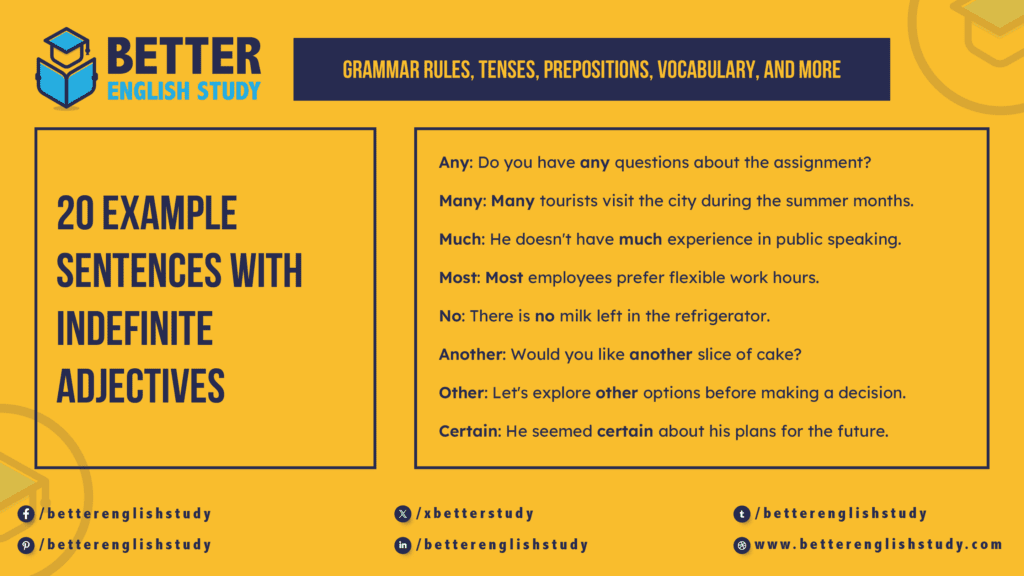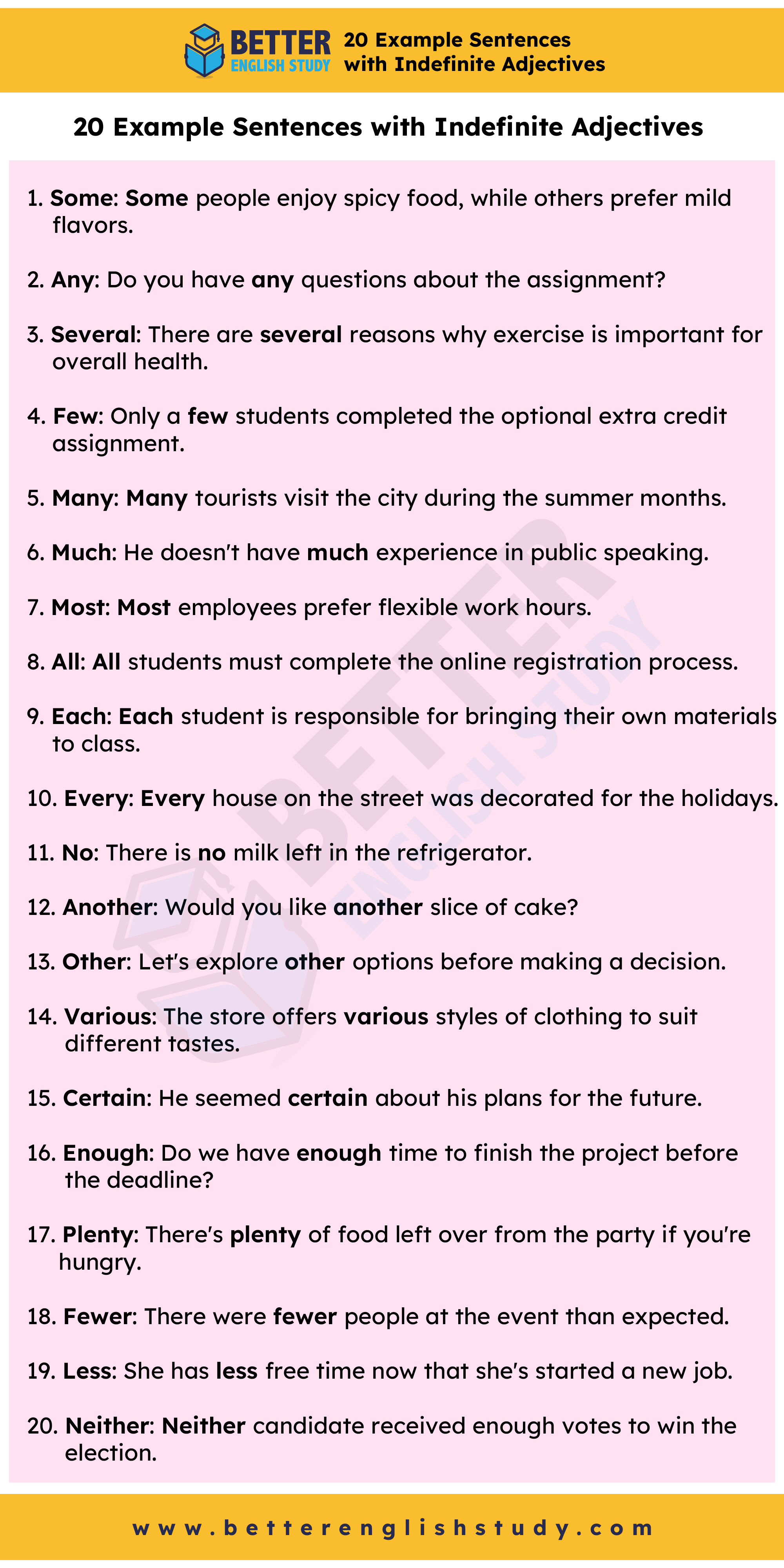
Indefinite adjectives are a diverse group of words that express an unspecified or indefinite amount or quantity of something. These adjectives play a crucial role in English grammar, allowing us to describe nouns in a general or non-specific manner. Understanding and correctly using indefinite adjectives can greatly enhance your language skills and improve the clarity and precision of your communication.
What Are Indefinite Adjectives?
Indefinite adjectives are words that provide information about nouns in a non-specific or indefinite way. They often indicate an unspecified quantity, amount, or degree. These adjectives are versatile and can modify both countable and uncountable nouns.
Some common indefinite adjectives include “some,” “any,” “several,” “few,” “many,” “much,” “most,” “all,” “each,” “every,” “no,” “another,” “other,” “various,” and “certain.”
Examples of Indefinite Adjectives
Here are some examples of indefinite adjectives and their usage:
- Some: Can I have some water?
- Any: Do you have any questions?
- Several: There are several options to choose from.
- Few: Only a few people attended the meeting.
- Many: She has many friends.
- Much: He doesn’t have much time.
- Most: Most students passed the exam.
- All: All the students received certificates.
- Each: Each student has a different perspective.
- Every: Every house on the street was decorated.
- No: There is no milk left in the fridge.
- Another: Would you like another piece of cake?
- Other: Let’s consider other possibilities.
- Various: There are various ways to solve the problem.
- Certain: He seemed certain about his decision.
How to Use Indefinite Adjectives in Sentences
Using indefinite adjectives correctly involves understanding their meanings and grammatical functions. Here are some examples of how to use indefinite adjectives in sentences:
1. Some
- Example: “I bought some apples at the grocery store.”
- Usage: “Some” indicates an unspecified quantity or amount of apples.
2. Any
- Example: “Do you have any plans for the weekend?”
- Usage: “Any” is used in questions and negatives to refer to an unspecified item or amount.
3. Several
- Example: “She invited several friends to her birthday party.”
- Usage: “Several” indicates an unspecified but relatively large number of friends.
4. Few
- Example: “There were few people at the park on a rainy day.”
- Usage: “Few” indicates a small number of people, fewer than expected.
5. Many
- Example: “Many students participated in the school play.”
- Usage: “Many” indicates a large but unspecified number of students.
6. Much
- Example: “There isn’t much time left before the deadline.”
- Usage: “Much” indicates a large but unspecified amount of time.
7. Most
- Example: “Most of the guests arrived before dinner.”
- Usage: “Most” indicates a majority or the largest part of the guests.
8. All
- Example: “All the lights were turned off before leaving.”
- Usage: “All” indicates the entirety or completeness of the lights being turned off.

Common Mistakes and Tips
1. Confusing Some and Any
Ensure you use “some” in affirmative sentences and “any” in questions and negatives.
Incorrect: Do you have some plans for the weekend?
Correct: Do you have any plans for the weekend?
2. Using Many and Much Incorrectly
Use “many” with countable nouns and “much” with uncountable nouns.
Incorrect: There were many times left.
Correct: There wasn’t much time left.
3. Misplacing Indefinite Adjectives
Place indefinite adjectives before the noun they modify for clarity.
Incorrect: He has friends many.
Correct: He has many friends.
20 Example Sentences with Indefinite Examples
- Some: Some people enjoy spicy food, while others prefer mild flavors.
- Any: Do you have any questions about the assignment?
- Several: There are several reasons why exercise is important for overall health.
- Few: Only a few students completed the optional extra credit assignment.
- Many: Many tourists visit the city during the summer months.
- Much: He doesn’t have much experience in public speaking.
- Most: Most employees prefer flexible work hours.
- All: All students must complete the online registration process.
- Each: Each student is responsible for bringing their own materials to class.
- Every: Every house on the street was decorated for the holidays.
- No: There is no milk left in the refrigerator.
- Another: Would you like another slice of cake?
- Other: Let’s explore other options before making a decision.
- Various: The store offers various styles of clothing to suit different tastes.
- Certain: He seemed certain about his plans for the future.
- Enough: Do we have enough time to finish the project before the deadline?
- Plenty: There’s plenty of food left over from the party if you’re hungry.
- Fewer: There were fewer people at the event than expected.
- Less: She has less free time now that she’s started a new job.
- Neither: Neither candidate received enough votes to win the election.
Practice Makes Perfect
To master indefinite adjectives, practice using them in various contexts and sentences. Try to incorporate them into your everyday conversations and writing to become more familiar with their usage and nuances.
Indefinite adjectives are valuable tools in English grammar, allowing us to describe nouns in a non-specific or indefinite manner. By understanding their meanings and usage, you can enhance your language skills and communicate more effectively. Practice using indefinite adjectives to become more proficient in English grammar and expression.
FAQs about Indefinite Adjectives
What are indefinite adjectives?
Indefinite adjectives are words that express an unspecified or indefinite amount, quantity, or degree of something.
How do indefinite adjectives differ from definite adjectives?
Definite adjectives provide specific information about a noun, while indefinite adjectives offer non-specific or indefinite information.
Can indefinite adjectives modify both countable and uncountable nouns?
Yes, indefinite adjectives can modify both countable and uncountable nouns, providing non-specific information about the quantity or amount of the noun.
Are there indefinite adjectives for negative statements?
Yes, indefinite adjectives like “no” and “none” are commonly used in negative statements to indicate the absence or non-existence of something.
How can I improve my understanding of indefinite adjectives?
Practice using indefinite adjectives in sentences, paying attention to their placement and usage in different contexts. Reading and exposure to English language materials can also help reinforce your understanding of indefinite adjectives.
Mastering indefinite adjectives is essential for effective communication in English. By practicing their usage and becoming familiar with their meanings and functions, you can enhance your language skills and express yourself more confidently and accurately.
